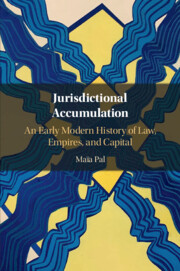Book contents
- Jurisdictional Accumulation
- Jurisdictional Accumulation
- Copyright page
- Dedication
- Epigraph
- Contents
- Acknowledgements
- Introduction
- 1 Early Modern Extraterritoriality
- 2 Historical Sociology, Marxism, and Law
- 3 Social Property Relations
- 4 Ambassadors
- 5 Consuls
- 6 Colonial Practices of Jurisdictional Accumulation
- 7 Analytical Crossroads
- Epilogue
- Bibliography
- Index
4 - Ambassadors
Published online by Cambridge University Press: 15 October 2020
- Jurisdictional Accumulation
- Jurisdictional Accumulation
- Copyright page
- Dedication
- Epigraph
- Contents
- Acknowledgements
- Introduction
- 1 Early Modern Extraterritoriality
- 2 Historical Sociology, Marxism, and Law
- 3 Social Property Relations
- 4 Ambassadors
- 5 Consuls
- 6 Colonial Practices of Jurisdictional Accumulation
- 7 Analytical Crossroads
- Epilogue
- Bibliography
- Index
Summary
Chapter 4 links analyses of social property relations to scholarship on the social origins of the diplomatic corps and the aristocratisation of ambassadors from the late-seventeenth century. It presents the debates in diplomatic theory and history regarding the social origins or functions of actors regarded as necessary or ideal to fulfil diplomatic duties. The chapter argues that the aristocratisation of ambassadors led by France and Castile can be understood as a jurisdictional strategy of collaboration between noble classes and sovereigns to sustain an 'old regime' Europe. The typology of jurisdictional accumulation can be used to contrast French and Castilian strategies of ambassadorial recruitment as transplants of authority, with English and Dutch counterpart strategies as transports. Transplants mark the former’s more embodied and organic reliance on the prestige of the person of the ambassador, whereas the latter favoured the potential utility and political requirements of their more merchant-based imperial agents in shaping the social diversity of their ambassadorial corps, and therefore can be identified through the more functional concept of transports.
Keywords
Information
- Type
- Chapter
- Information
- Jurisdictional AccumulationAn Early Modern History of Law, Empires, and Capital, pp. 159 - 193Publisher: Cambridge University PressPrint publication year: 2020
